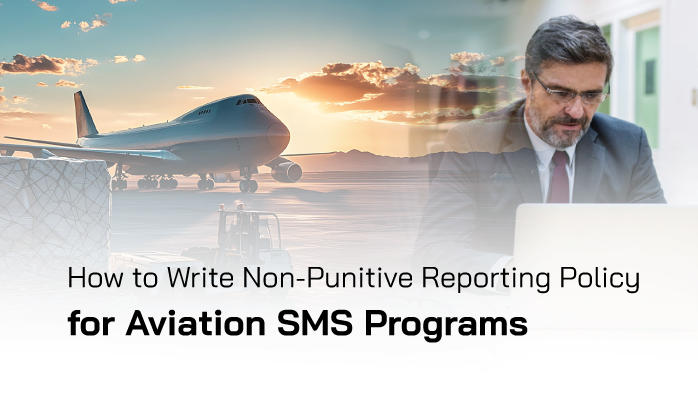Purpose of Non-Punitive Reporting Policies in Aviation SMS Programs

Dedicated, hard-working safety managers drive the setup of airline and airports' aviation safety management systems (SMS).
These safety managers are often left to decipher ambiguous requirements that are open to multiple interpretations. This comes into play, especially when upper management wants to "pencil-whip" an aviation SMS and merely check the boxes.
Most safety managers are not content to merely "check the box." They have integrity and want to do the right thing. After all, each of us wants to do the best job we can.
Phase 2 of an ICAO compliant safety management system implementation requires operators to set up the reactive risk management processes. One part of these reactive risk management processes is the "hazard reporting system," which can be as simple as paper-based reports, or as complex as electronic forms on the Internet that notify safety managers whenever new hazards are reported.
Related Reactive Risk Management Articles
- What Is Reactive Risk Management (Why It’s Essential for Aviation SMS)
- From Reactive to Proactive Risk Management in Aviation SMS
- Difference Between Reactive, Predictive and Proactive Risk Management in Aviation SMS
An essential element of this hazard reporting system is the "non-punitive reporting policy." Non-punitive reporting policies:
- Reduce friction (resistance) to the aviation SMS program;
- Builds confidence in the SMS processes;
- Help engender trust between front-line employees and managers;
- Are the basis of the "just culture;"
- Explain which actions are not immune from management's disciplinary actions; and
- Offer a clear understanding of what to expect when employees submit hazard reports.
In this article, we'll describe:
- What one expects in a non-punitive reporting policy;
- Discuss the importance of reviewing your non-punitive reporting policy; and
- Provide a template for you to use or modify at your discretion.
Non-Punitive Reporting Policies Are VERY Important

Not all safety cultures have adapted "just culture" concepts. In several Asian countries, there will always be somebody to take the blame. Heads must roll. When employees realize that consequences follow reports of bad news, how often will you expect employees to report?
In short, without an effective non-punitive reporting policy, your hazard reporting culture will not exist!
Whenever there is some degree of protection, employees are more inclined to participate in SMS programs and take ownership of the processes.
Note how I stressed "some degree of protection." Employees should never expect a blind eye whenever there is:
- Willful misconduct;
- Unwillingness or inability to learn from past similar events;
- Deliberate neglect of the involved parties; or
- Unlawful conduct.
Management must always conduct a thorough and careful analysis of the event whenever determining whether or not to honor the non-punitive reporting policy.
Your hazard reporting culture depends on management doing the right thing in every instance. Regaining employee trust after management breaks the tenets of just culture will devastate your hazard reporting culture.
Related Hazard Reporting Culture Articles
- Indicators of Good Hazard Reporting Culture
- Essential KPIs for Poor Hazard Reporting Cultures in Aviation SMS - With Free KPI Resources
- How Aviation Safety Managers Can Improve Safety Reporting Cultures
Getting the Non-Punitive Reporting Policy Rightly Worded
Non-punitive reporting policies are not new. Some regions call these policies their "safety reporting policy." This label may be confused with another policy whose purpose is to outline what types of reports your company desires to enter its aviation risk management process and the guidelines for submitting these safety reports.
Several non-punitive reporting policy templates have been made available over the past ten years. It is probable that if your company has a non-punitive reporting policy, it originated from a template that came from an SMS training provider or one of the civil aviation authorities known for publishing good aviation SMS content.
From experience, I have found that these CAAs produce the best content, in order of excellence:
- Civil Aviation Safety Authority (CASA-Australia);
- Federal Aviation Administration (U.S.); and
- Transport Canada.
If you started your non-punitive reporting policy from a template, did you change the name of the company in the template? I don't know how many times I've heard the story of auditors going into an airline or airport to find very nice SMS documentation. The only problem was that in many cases, the safety manager neglected to change the company name.
Copying manuals were very common five years ago. One could purchase an SMS manual for as little as USD 1200. The problem with this approach is that SMS manuals are unique to the operator, as each operation is unique. Your risk management procedures may not align with the procedures from another company. This can prove to be an embarrassing situation for safety managers. If you get an audit finding because of another company's name in your SMS manual, you deserve it.
Templates are great places to start your non-punitive reporting policy. They serve as a great starting point or inspiration to quickly craft a non-punitive reporting policy that is suitable for your management's style. Just make sure you review and make the necessary amendments before you publish your policy.
Get Management Support for Reporting Policies

Non-punitive reporting policies may be seen as idealistic and too liberal for many managers. Before posting your non-punitive reporting policy, make sure that top management supports the concepts outlined in your policy and that this policy is communicated to all members of your airline or airport.
Also, be careful that management is practicing what your SMS program's policies are preaching. That is, be consistent in applying the policy. If your policy states that management respects the concept of "anonymous reporting," do not violate this trust by seeking out the reporter of an anonymous report.
On the same token of anonymous reporting, your company may support "confidential reporting." We define "Confidential reporting" as a report that:
- Protects the reporter from reprisals;
- Is not shared outside the safety department;
- Is not "anonymous" (we know who reported the issue).
Confidential reporting affords employees a degree of protection should they wish to report behavior that they don't feel comfortable sharing for fear of retaliation. This is commonly the case of whistleblowers who may be going outside the normal "chain of command."
Have You Read
- Learn How Confidential Aviation Hazard Reporting Systems Offer Assurance to Employees
- How to Improve Confidence in Aviation Safety Programs
- 10 Most Important Hazard Reporting Forms Aviation SMS
Make Sure to Review Reporting Policies Annually
There must be a mechanism in place to ensure your aviation SMS policies are reviewed regularly. Some advanced aviation SMS software programs will send managers an alert whenever policies require review. However, you don't need anything fancy. Simply put a date into your calendar to serve as a reminder.
There is a risk when putting an alert into your calendar to review policies. What happens when you leave the company or move to a different department? Not your problem, some will say. But most safety managers are sincere, dedicated professionals and will find a way to minimize this risk.
Policies should be reviewed and accepted by upper management. Safety managers typically act as facilitators in this regard.
Final Thoughts on Non-Punitive Reporting Policies
Non-punitive reporting policies are essential to developing a just culture and enhancing your airline or airport's hazard reporting culture.
It is never too late to implement such a policy. And don't forget to review it regularly. Many aviation SMS software programs have management tools to remind managers that policies and procedures require review. To see this system in action, request a demo.
You may be interested in comparing your non-punitive reporting policy with one of three industry-accepted templates.
Last updated March 2025.







